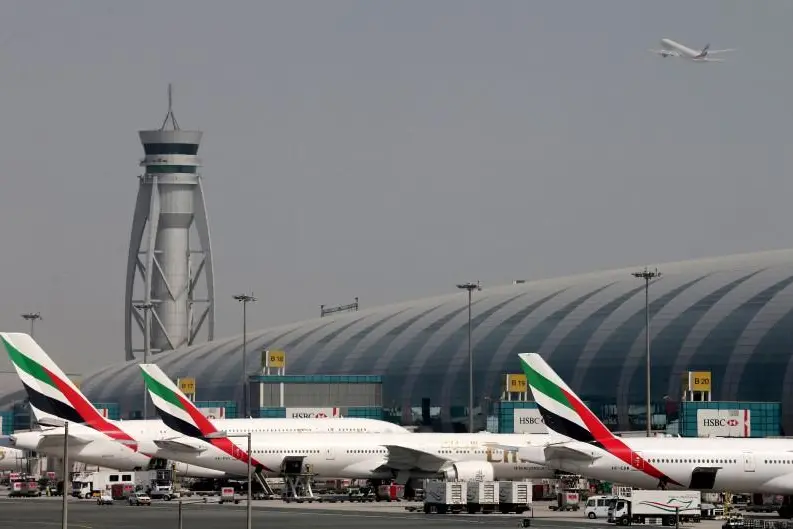PHOTO
The global aviation sector is expected to pick up next year, and the trade war between the US and China will be resolved at around the same time as the US heads into its presidential elections, said Sir Tim Clark, president of Emirates airline.
While speaking at an aviation conference in Dubai on Monday, Clark warned that airfares could surge as a result of the tit-for-tat tariff war between the US and Europe on import of aircraft.
"Global consumer confidence is falling and we are in a state of disequilibrium. It can be salvaged. With the US presidential elections next year, we may see the two economies - US and China - start activating in the first quarter of the year. In my view, by this time next year, the trade war will be history and the global economy will be moving," Clark said.
He, however, warned that as a result of the hike in tariffs by US President Donald Trump, Europe will reciprocate next year. "If Europe hikes the import tariffs, the prices of aircrafts are likely to rise and the cost of travel."
The US said it would impose a 10 per cent tax on European jetliners following a World Trade Organization (WTO) ruling that Airbus benefited from illegal state aid.
Air transport's contribution to UAE economy already significant
The International Air Transport Association (Iata) last week noted that the aviation sector could generate an additional 620,000 jobs and an extra $80 billion to the UAE's GDP by 2037. The industry at present supports nearly 800,000 jobs and contributes $47.4 billion to the economy, accounting for 13.3 per cent of the UAE's GDP.
"If the government continues to pursue a positive agenda for aviation, the UAE's aviation market will grow 170 per cent by 2037, support 1.4 million jobs and contribute $128 billion in GDP to the nation's economy," Iata said in its latest report about the UAE.
No impact of Brexit
Meanwhile, Tim Clarke ruled out any impact of Brexit on travel demand.
"Paradoxically, since Brexit started, the demand on Emirates to the UK has been growing six to eight per cent. I am optimistic that the momentum will continue even if the UK leaves the EU," he said.
Furthermore, he revealed that Emirates' cargo handling subsidiary, Dnata, had exposure to collapsed British travel firm, Thomas Cook.
"Dnata was ground-handling agent and caterer, and purchased from Thomas Cook; so assessment of the exposure is going on, but it is not small," he added.
The world's oldest travel firm, Thomas Cook, collapsed last month, resulting in hundreds of thousands of holidaymakers stranded.
"I had earlier said that there were some airlines, who were operating at the margins of profitability, and that their business models will not be sustainable," he told the conference.
Return of the Boeing 737 Max
Commenting on the return of Boeing's 737 Max, Clarke noted that the aircraft will not fly until it's 150 per cent secured.
"There is a disharmony among global regulators. We must get unanimity of regulators. You cannot get aircraft flying in the US and not in Europe, as this will definitely delay the return of the Max," he stressed.
Going forward, he said that there are tier two, three and four cities that are being underserved and that is where Emirates will be growing over the next 10 years.
Clark also said that he doubts that the airline will receive any of the 115 Boeing 777-9s it had ordered next year, as Boeing grapples with challenges in building the jet.
"By the end of next year, we were to have eight of them. Now, it doesn't look like we will have any," Clark said.
Stable summer season
Adel Ali, group CEO of Air Arabia, said that the summer has been good and fuel prices are also fairly-priced, hence, all going is good for the year.
However, he also noted that the carrier is suffering from slow deliveries as it was supposed to receive five aircraft, but was delivered only two. Ali expects a decision about the 115-120 aircraft order by January 2020 as the airline is also looking at medium to long-term scenarios for its business model.
Rohit Ramachandran, CEO of Jazeera Airways, said during the conference that the Kuwait carrier will take a call about an order of new 22-25 narrow-body aircraft early next year. He hinted that they will either go for the A320 Neo or 737 Max, and that deliveries will be post-2022.
Mohamed Ahmed, CEO of SalamAir, hoped that the Omani airline will carry 1.3 million passengers in 2019, and expects to more than double that figure to three million in 2020. He said that SalamAir is close to breaking even this year and could turn a profit in 2020, thanks to low fuel prices.
Stefan Pichler, CEO of Royal Jordanian, said that the airline plans to order 18 narrow body aircraft and that an announcement is expected later this month.
Copyright © 2019 Khaleej Times. All Rights Reserved. Provided by SyndiGate Media Inc. (Syndigate.info).





















